 tag/self
tag/self
2017.01.12
In Cat's Cradle, Kurt Vonnegut introduces the concept of a "wrang-wrang": a person who steers people away from a line of thinking by reducing that line, with the example of the wrang-wrang's own life, to an absurdity.
I'm trying to make Homer Simpson my wrang-wrang. Specifically this clip:
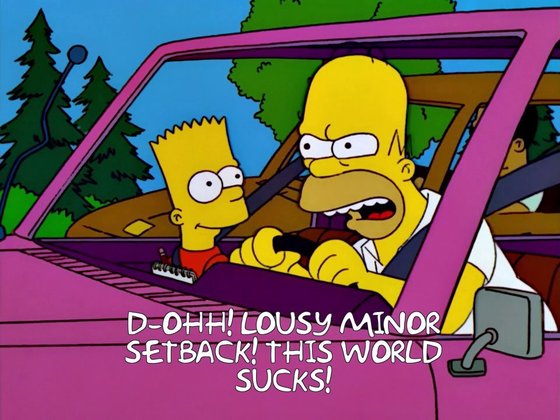
A sudden irrational and disproportionate fury at somewhat trivial things that are out of my control. In some circumstances I'm almost too controlled, many of my potential feelings of desire have to be vetted by my inner judge before they're allowed... but the feeling of "this is just wrong" rises up in a sudden furious tantrum, and I don't like that about myself. (It's gotten me into trouble in previous jobs; it's not that I rant and rave endlessly, it's just that one moment of exposed anger, even if directed at a system and not an object, can make people very uncomfortable.)
The issue has been on my mind for a while. In 2008 I wrote
"C'est la Vie!" / accepting that / "this should not be!" / but coping / more stoically; / philosophically-- / "C'est la vie..."
A few years later I read about William Irvine's modern application classical Stoicism, in "A Guide to the Good Life'; protecting one's equanimity and contentment at all costs, in part by triaging the world into things one has complete control over, no control over, and somewhere in between, and attending only to the first and last category, along with "negative visualization" - a meditative technique of thinking about how bad things could get, and then being happy when they're better than that; and realizing that you'd be able to cope even if they were that bad. So that was helpful, but just recognizing that a situation was out of my control didn't actually help my equanimity all that much.
Other approaches suggested themselves. I wrote this in 2015:
Recently a conversation with Derek gave me the idea of approaching the world with a kind of cheerful pessimism- assume that "a bit screwed up and annoying" is kind of the natural state of the universe, that things WILL be messed up, but generally not irretrievably so, and then be extra cheerful when the dice roll your way. "Lousy minor setbacks" that could otherwise be absolutely and inappropriately infuriating become almost soothing reminders that Murphy's in His Heaven and all's right, or wrong in the right way, with the world.
Again, that sounded better on paper than in real life, in terms of not being upset. I don't really want to be all that dour all the time.
In early 2016, I stumbled on "Amor Fati" - still a concept that resonates for me, a call for the cultivation of love of one's fate, even the parts that are unpleasant, that you wouldn't have it any other way. As Nietzsche put it:
"My formula for greatness in a human being is amor fati: that one wants nothing to be different, not forward, not backward, not in all eternity. Not merely bear what is necessary, still less conceal it--all idealism is mendacity in the face of what is necessary--but love it."
I felt - still feel - that much of the problem is that our monkey brains are so good at daydreaming up these alternate realities that are just like this one, but better - this same roadway, this same car, not all these other cars - but those realities don't exist in our world, except for the power we give them to make us unhappy.
Later in the fall I also stumbled on the idea of using empathy to make situations more palatable. In its more extreme form, this is a kind of hippy-dippy "we are all one thing", but even without going to that extreme, if you see yourself on a common team of humanity, someone cutting you off might be a win you can share in. Of course, this doesn't apply to traffic jams so much, at least when everyone is equally stuck. (Remember- you're not 'in' a traffic jam, you 'are' the traffic jam)
But now I've found what seems the strongest counter-formula yet... the recognition of this weird animism humans tend to have, that we look for intent and purpose even in things that are just accidental and emergent. The first stage of the this realization was that "it is absurd to take traffic personally". And yet I do. Later, in the movie "Mistress America" I found the even wider application: "The path isn't against you. It's just the path." I've been finding that a very useful mantra lately. Similarly, when I get mad at a malfunctioning device or app, I should give it some sympathy, or even empathy; it's doing the best it can, you know? It has no sense of mischievousness, and it's more accurate to presume it would like to be doing a good job for me than whatever its current results actually are.
The other nice thing is that these various view points are complementary, they don't really undercut each other that much. (I've been told that's characteristic of Eastern religions, in general they are less combative, and defensive of their "unique path to truth" sense, than many Western outlooks.)
The traffic isn't against you. It's just the traffic.
FOLLOWUP (2017.02.27): Whether I'm furious about it and making myself angry or accepting of it, the traffic is still there. So why be furious? The only counter-example is if my rage now helps me avoid future bad traffic. But I could probably do that via rationality, not just gut level rage...
2017.08.26
Lately I've been thinking of how I operate with a two-layer view of reality; simple objective reality, the first level of facts, and subjective interpretation, the second level of judgements. My emphasis is on supporting a shared understanding of that first objective level; to the extent that most of my "judginess" involves things that block understanding of that factual leve (in other words, people with agendas that make propaganda that distorts the underlying facts) and I also have a severe reluctance to judge people's behaviors in typical ways - since if I start judging on that second level (with its proclomations of what people "should" do) it increases the chance I might be incorrectly working based on assumptions about "facts on the ground" that I'm wrong about.
So, I'd like to think that David's comment bothered me because of how it might be indicating that I'm just objectively wrong. But there's the conservative-related view that no, I'm bothered not because I'm wrong, but because someone in my peer group thinks I'm wrong. Rightwingers have really leapt on this concept of "mere virtual signaling" - they are awfully dismissive of most attempts to say the right thing, because they find it likely to be insincere. This accusation is at risk of mixing up the medium (other people's opinion) for the message (a description of objective facts-on-the-ground reality - or in the case of judgement, an opinion most likely and widely agreeable (i.e. the facts about what personal growth is and isn't.))
In this "fake news" age of "truthiness", I'm a liberal in part because I think liberals are more humane - who look to expand the "circle of empathy" - and because they are also amenable to level one reasons - especially in terms of science - in a way conservatives ain't - especially with their emphasis on faith. Now, the conservative view might point to examples of liberals desire to be humane distorting their interpretation of plain facts, and in some cases that's true, but I find in general liberals have the edge in not going for "if the facts don't match the theory, change the facts". (Hm, I think this is why I find the self-appointed name "objectivism" so objectionable, with it's dubious claim that there's an ironclad connection between level one facts and level two interpretation and recommendation for behavior that "objectivists" have unearthed.)
Yesterday I was listening to a 2015 podcast where Marc Aaron interviewed President Obama. A quote that struck around 42:30 "But the truth is though, it is accurate to say I believe in reason. And I believe in facts. And I believe in looking at something, and having a debate and an argument, but trying to drive it towards some agreed upon set of assumptions about what works and what doesn't."
Maybe there's a correlation with my "profound shallowness". I don't trust things that aren't directly accessible. For example, I don't like music that demands (and hopefully rewards) deep and attentive listening. You can take my "recently added playlist" and with very little further curating have a good mix for a party. My view is if there's an art form that demands you work to understand it, that "sophisticated" audience is now vested in promoting its quality (if not of the individual artwork, than of the worth of the format as a hole) because it justifies the effort they put into learning how to appreciate it. I like video games with physics engines rather than story, I like board games that are about performance and creativity and not strategy and planning, because the appeal is visceral and harder to deny, rather than cerebral and debatable and more prone to subjective uncertainties.
(PS speaking of that first level/second level stuff - notice how I hedge almost every paragraph? "I think" "is at risk for", "might", "maybe"... is my habit of couching things that way acknowledging the difficulty of getting to objective truth and the uncertainty of any position at the second level of judgement? Or is it me just covering my ass so none of my peers can say I'm wrong? Or both?)
2019.03.03
Limerence is a term the author invented for overwhelming romantic feeling that many people seem prone to - but many aren't. The nearest synonym might be "infatuation", but Tennov is trying to describe something less adolescent and more beautiful than that - the lovely neologism "limerence" certainly has echoes of "luminous" or "liminal".
Trying to think of cultural referents for "limerence", I recalled this quote from the ending of the movie "True Romance":
Amid the chaos of that day, when all I could hear was the thunder of gunshots, and all I could smell was the violence in the air, I look back and am amazed that my thoughts were so clear and true, that three words went through my mind endlessly, repeating themselves like a broken record: you’re so cool, you’re so cool, you’re so coolThat gets to the spirit of it about as well as anything in Hollywood. (Though when I think about "A Fish Called Wanda" - the way John Cleese's character and his wife undress for the night in a companionish way before heading to their separate single beds, vs how he lights up for Jamie Lee Curtis' Wanda - that's a great case study as well.)
I have a theory that sometimes "limerence" is idolized in our society because people want the relationships they deeply invest in to be beyond the reach of market forces. To quote the grand balladeer Weird Al:
You're sort of everything I've ever wantedNo one wants to be subjected to that! Even if the state of limerence is famously fickle, people look for that beautiful madness as inexplicable, nostalgic bedrock to set their relationship on - maybe even for a future family - even if they are aware that the initial rush may die down.
You're not perfect, but I love you anyhow
You're the woman that I've always dreamed off
Well, not really, but you're good enough for now
As some who generally is, as the book puts it, "nonlimerent" (or at least since college) I got to wondering about the neurochemistry of it all - the descriptions of the state reminded me of the euphoria of certain drugs... I wonder if people inclined to that kind of feeling more prone to drug or alcohol abuse, or are they especially susceptible to hypnosis - i.e. are they vulnerable to go other places where conventional rationality (and rational convention) is put aide?
But those questions may be self-serving FOMO sour grapes from a nonlimerent! (I sometimes feel stunted as an emotional person that I have an internal gardener that will examine seedlings of emotion that spring up and quick weed out ones that don't make sense...) Especially when the book builds on Stendhal's metaphor of "Crystalization":
In the salt mines, nearing the end of the winter season, the miners will throw a leafless wintry bough into one of the abandoned workings. Two or three months later, through the effects of the waters saturated with salt which soak the bough and then let it dry as they recede, the miners find it covered with a shining deposit of crystals. The tiniest twigs no bigger than a tom-tit’s claw are encrusted with an infinity of little crystals scintillating and dazzling. The original little bough is no longer recognizable; it has become a child’s plaything very pretty to see. When the sun is shining and the air is perfectly dry the miners of Hallein seize the opportunity of offering these diamond-studded boughs to travellers preparing to go down to the mine.Who wouldn't want to be connected to that kind of beauty, even if it's all in the eye of the beholder? Or short-lived? As Joe Haldeman put it in "The Forever War":
But love, he said, love was a fragile blossom; love was a delicate crystal; love was an unstable reaction with a half-life of about eight months.And so I think back to relationships where I've been a bit more limerent - the foreign exchange student in high school, where it feels like a kind of limerence was mutual, to the on-again/off-again in college that was much more one-sided. I don't get sparks like that too often. Mortifyingly, sometimes the strongest echo of those times comes with a little frisson of excitement I get with certain technological devices - to cite an old Dilbert:

Clearly, unless one has embraced a Shinto / animistic outlook (or accepted Tom Robbins' "Still Life with Woodpecker"s view of our bias against inanimate objects as being a bit uncalled for) this delight in mere "things" is a bit untoward - but what can I say? Some gadgets embody supreme elegance! - and they empower me without making demands on me, and without me having to risk rejection...
Heh, in a too-long ramble already brimming over with quotes, what's one more? Here's Carrie Fisher journaling while mooning over Harrison Ford:
I've got to stop getting obsessed with human beings and fall in love with a chair. Chairs have everything human beings have to offer, and less, which is obviously what I need. Less emotional feedback, less warmth, less approval, less patience and less response. The less the merrier. Chairs it is. I must furnish my heart with feelings for furniture.An affection for gadgets and furnishings aside, what are the implications for romance among the nonlimerent? Again, I turn to the movies, specifically "Birdman":
"You know, just because I didn't like that ridiculous comedy you did with Goldie Hawn did not mean I did not love you. That's what you always do. You confuse love for admiration."Oh, man. THAT is just what I do, in spades. In every significant romance with which my past and present has been graced, I can dig and find that admirable quality: "the most" - she was the most beautiful, this one the most exotic, that one the most academically accomplished, or the cutest, or the smartest, or the funniest, or the kindest or... certainly not "the most _____" in the whole world, but in MY world.
And with some of those categories... if I'm forthright (and I strive to be nothing if not unflinching and truthful about myself) there's an ego aspect with it, or at least a need for validation. Sometimes I don't want to be around that admirable quality merely for its own sake, or as an inspiration for my self-improvement, but so that the world can see me near it - and for my own insecurity - I am affirmed that I'm worthy of wooing the bearer of a quality so fine, in the eyes of the world, and of myself.
So, back to the book. It definitely has the 60s/70s feel of its era - kind of like the book "Everything You Always Wanted to Know About Sex" - people being frank and reflective about their experiences during an era of transition, where men and women were reconsidering their relationship with the world and with each other. And I guess in the end, its conclusion is... you're either limerent or you're not, or at least, mostly not. And there's not a lot you can do it about it, but it's important to be sympathetic to the people that are.
I'm grateful to this book for letting me come to terms with the fool I was when I was limerent and the more sedate guy I am now.
2019.03.07
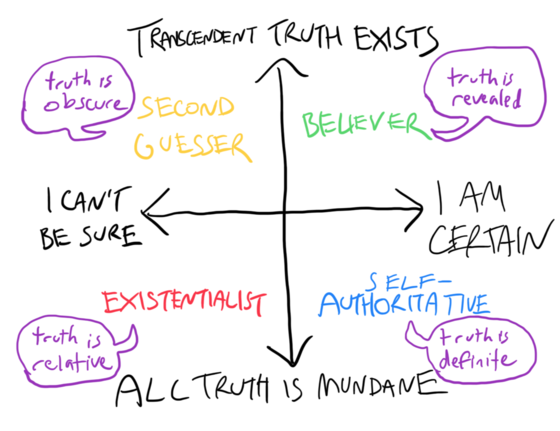
Lately my work went over the DiSC personality assessment. At one point we got to discussing the "Conscientiousness" type. Our session leader's assumption that I, as someone who desperately tries to see things from all angles, would be a "C"-type, since they are so urgent that things are correct, and therefore would have done their due-diligence. I disagreed that I was that type - I think what is critical is that the "C"-type folk have FOUND what they believe to be the best answer, and are then content to enforce that as best practice, while I tend to think there IS a best practice but we can never be certain we are aligned with it- but it's important that we give people the freedom to figure out their best guess as well.
So the critical factors seem to be - is there a singular best truth, and how certain can we be that we've gotten there? I think that makes a 4-quadrant spectrum, as shown here.
I know I am deeply in "Second Guesser" territory. I have this near unshakable suspicion that a transcendent truth exists - and while it's not "unknowable", we can never be certain that we've arrived at knowledge and so need to be interested in all viewpoints - all viewpoints from people of good intentions are valid signposts to what is "really" true.
The opposite view I'm calling "Self-Authoritative" until I think of a better name. There is no out-of-system truth in this view - but there are some patterns that are "clearly" better than others, and we can be confident in the superior qualities of our own subjective viewpoint.
"Believer" is my name for the top-right -- there is truth, and (possibly through special revelation) we can have faith in the accuracy of our beliefs.
Probably my most liberty-taking name is "Existentialist" -- all truth is subjective, and we'll never be positive about what's best, so every person is free to work things out for themself, and you don't have to be too anxious that other people aren't believing the "right" thing.
So does this ring true for anyone else? (asks the second guesser) Any improvements for quadrant names, or other axes that might be more useful in an epistemological kind of way?
Followup: it bums me out that Facebook is my best avenue for dialog these days (I crosspost nearly everything here and on that site) but the convo on this diagram with threads with Wendi and David was pretty good.
Followup 2: Similar to the DiSC assessment, but more resonant to me, Grentchen's Rubin's Four Tendencies model seems true to me. That link is the quiz, but the summary you get at the end goes:
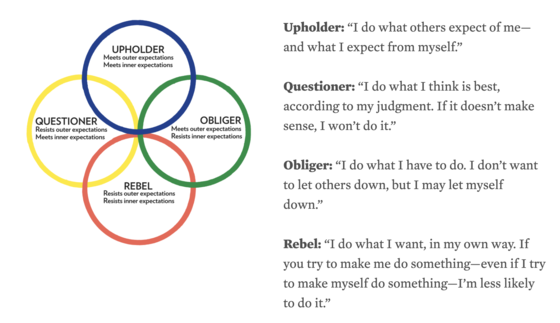
I'm a questioner - though again, this taxonomy misses the epistemology of it. A questioner who is certain of themselves because of their own authority is different than one who is certain of themselves because of their image of an external objective standard. And I probably am closer to upholder because I respect the potential of other people's views of that objective truth.
Sigh. Getting to Inbox Zero / Todo Zero, or failing to (even when the "zero" just applies to the categories marked as relevant") is feeling like such a daily grind.
Franklin Lloyd Wright liked the term "Usonia" for the United States (of North America). I wish it had caught on (even with the gratuitous "i" to make it more euphonious) - it answers two problems: "United States" or "USA" is more of a description than a name, and it stops us from grabbing the name of two continents ("America!") to make up for the first problem.
(That said, I don't think "America" is THAT oppressive, since a person actually referring to the continents would says "Americas" or specify "North America"... mostly I prefer Usonia as a pleasant sounding name, vs a technical description.)
2019.05.19
The back story: my parents are officers in The Salvation Army, which (in parallel with its emergency and charity operations) is a church; a denomination called "Salvationism", a near offshoot of the Methodists that took the idea of waging a war against sin to heart, and modeled itself after a military - churches are called corps, members are called soldiers, pastors are called officers and there are uniforms, with tunics and hats and everything.
As in the military, officers get assigned to live wherever the 'Army feels their skills will be put to the best use, and so "OKs" (Officer's Kids) have to be braced for moving every few years.
So, looking back, here's roughly how I viewed the structure of authority:
I'm perched on top, the most precarious place. I am taught how I should live - and then, told WHERE I will live - by my parents. (Here represented by a home) But my parents are supported by The Salvation Army. It has the authority to tell them where to go and what to do, and they comply. The Salvation Army, then, was anchored on and drawing its authority from God. From God! Can't get much bigger than that!
I'm sure the whole "parents are your minister and representative of God" thing is another topic for therapist fun, but right now I'm thinking more about the top 3 levels; when you combine it with the Good of the many outweighs the good of the few or the one attitude I think I inherited from my mom (where our personal needs should not be ignored, but weighted in the general balance for choosing best course of action), you get an especially acute sense of "the group will ask sacrifices of you, and you must make them."
As an "OK", less than average of your material life is actually owned by your family... the quarters- the assigned house (or apartment over the church in my case) - will be mostly stocked with its own furniture. Utilities and reliable transportation will be arranged for and life will otherwise be frugal, and your parents are potentially on call at all kinds of hours - especially during that Thanksgiving-Christmas "Red Kettles" season. I'm not trying to bellyache, there are plenty of worse environments to grow up in - but still, the sense of authority and chain-of-command was strong, and The Salvation Army was a calling, not just a job - for example I had a precocious and impeccable "business" phone mojo going when answering the shared line, evn as a pipsqueak elementary schooler - my folks would be commended on their extremely polite secretary.
(My family was graced with longer appointments - I was especially lucky by "OK" standards of the time to be in mostly the same place for most of middle and high school. But I was bummed about the move from Western NY to Upstate NY before third grade, and had so much adolescent resentment moving to Cleveland after sixth that I switched to going by my middle name Logan as a form of existential protest. (err, before I knew it was a "Wolverine/X-men" reference))
So, too much backstory, here is the point, and the small epiphany: So I had deeply ingrained sense of the importance of the group. Imprinted on me: Groups are manifestations of greater goods (even when they don't claim to be prayerfully reflecting God's will) and so can expect sacrifices of you. And not only of you, but of loved ones you're with! People who probably won't be directly involved with the group on a regular basis, and who may have only had been partially aware of the strength of your commitments
(and being reliable isn't just import to me in terms of my concern for my reputation in the group, but my integrity as a person - a group being angered with me for not being dependable would be awful mostly as a signpost towards me not being a dependable person. (I think. Causing someone or some group strong bad feelings because of my own "selfish" needs also does poorly on "greater good" scale, so there is a social aspect of it - not just the objective judgement of God of me, the individual potential sinner.))
So, I need to remember that groups - mostly brass bands for me these days (which actually are also kind of a gift from The Salvation Army for me, come to think of it) - aren't just asking sacrifices from me me, but of me and my presence and energy that might otherwise by my partner's. I need to be more cognizant of that.
Bonus content: it took me years to notice there was a pun/metaphor in calling the printed offering envelopes "cartridges" - these are roughly the ones I grew up with
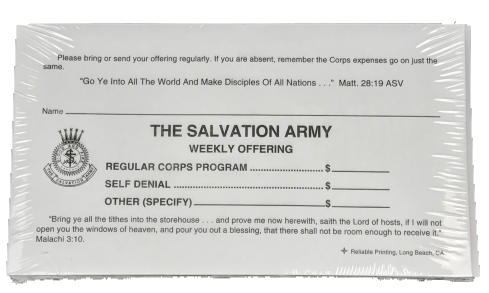
I remember the "If you are absent, remember the Corps expenses go on just the same". The admonition was watered down a bit from this antique one of the 1800s that has further instructions in a militaristic vibe.
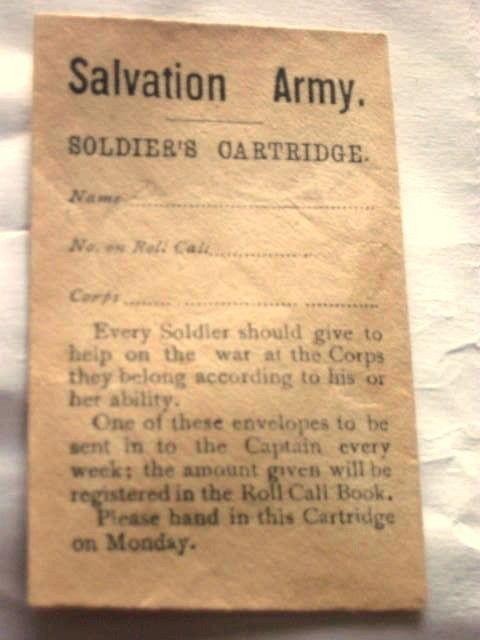
Ever wake up from a nap, and kind of disoriented? Your inner monologue is like "Ok... I think... I'm on a planet... called Earth? And it has... gravity? And sometimes frogs?"
Today at the Friendshipworks Walk to End Elder Isolation - a lesson in photographic perspective, and why you usually put the tuba player and the horn behind the arc not where it angles around... it kind of towers over everyone!
